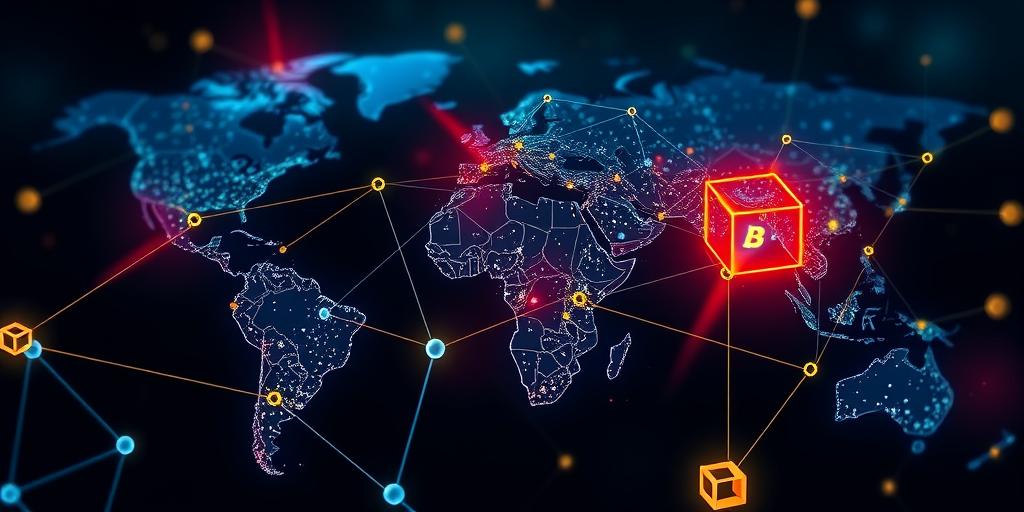Is it possible that blockchain technology could be the silver bullet we need to fight corruption in global supply chains? It’s a compelling idea, and one that’s attracting considerable attention from businesses and governments alike. The promise is tantalizing: a system of complete transparency, accountability, and traceability, all powered by immutable records. But is this utopian vision achievable, or is it just another technological pipe dream? Let’s dive into the complexities of using blockchain to fight supply chain corruption.
Blockchain’s Potential to Revolutionize Supply Chain Transparency
Imagine a world where every step in a product’s journey, from raw materials sourcing to final delivery, is meticulously recorded on a secure, shared ledger. This is the potential of blockchain. Each transaction, each location, each participant is transparently logged and validated, making it nearly impossible to hide illicit activities. This enhanced transparency could dramatically reduce instances of unethical labor practices, such as child labor, human trafficking, and forced labor. It could also help stamp out illegal logging, unsustainable sourcing of materials, and the trade in counterfeit goods. This level of visibility allows businesses to ensure their supply chains are ethical and sustainable, bolstering their brand reputation and meeting increasing consumer demands for transparency. Furthermore, using blockchain for supply chain finance can enhance efficiency and reduce fraud. The blockchain’s ability to provide real-time tracking allows for faster payment processing and better cash flow management. This reduces payment delays, improves trust between parties, and minimizes the risks associated with traditional, opaque financial systems.
Benefits of Blockchain for Enhanced Traceability
Blockchain technology offers several advantages in improving traceability. For example, in the food industry, blockchain can be used to trace the origin of ingredients, ensuring food safety and preventing the spread of contaminated products. It also helps identify the exact points in the supply chain where a problem occurs, speeding up recalls and mitigating potential health risks. This increased traceability enables companies to react quickly to potential issues, minimizing damage to their reputation and safeguarding public health. The detailed audit trail made possible by blockchain drastically reduces the chance of fraud, mislabeling, and other deceptive practices.
Addressing the Challenges of Blockchain Implementation
While the potential is immense, implementing blockchain technology across entire supply chains is not without its hurdles. One major challenge lies in the scale and complexity of global supply chains. Integrating blockchain across numerous participants, each with varying levels of technological capabilities, requires significant investment in infrastructure and training. Interoperability between different blockchain platforms also poses a significant challenge. A lack of standardization and widespread adoption makes it difficult for different systems to communicate effectively, hindering the creation of a truly integrated and seamless supply chain.
Scalability and Cost Considerations
Scaling blockchain systems to accommodate the vast amount of data generated by global supply chains is expensive. Maintaining the security and integrity of these massive ledgers requires significant computing power and energy, raising both cost and environmental concerns. The initial investment for businesses to adopt blockchain technologies can be considerable. This can pose a barrier to entry for smaller companies, especially in developing countries where corruption is often most prevalent. Furthermore, the complexities of implementing blockchain and the lack of skilled personnel can hinder adoption. Comprehensive training programs and supportive policies are essential for ensuring widespread acceptance and successful integration.
The Future of Blockchain in Combating Supply Chain Corruption
Despite these hurdles, the future of blockchain in combatting supply chain corruption remains bright. As the technology matures and becomes more cost-effective, we can expect broader adoption across various industries. Continued research and development are crucial for addressing existing scalability and interoperability challenges. The development of standards and protocols will be essential for ensuring seamless integration across different blockchain platforms. Collaboration between businesses, governments, and technology developers is vital for building a secure and efficient blockchain infrastructure that can effectively tackle corruption throughout global supply chains. Moreover, the increasing consumer demand for ethical and sustainable products creates a strong market incentive for businesses to adopt blockchain technology to enhance their supply chain transparency and accountability.
Regulatory Frameworks and Public-Private Partnerships
Government regulation also plays a crucial role in fostering the responsible use of blockchain for supply chains. Clear guidelines and standards are needed to avoid regulatory uncertainty and foster trust. Supportive policies can encourage the wider adoption of blockchain by businesses and help small companies adapt to this new technology. Public-private partnerships can further propel the development and implementation of blockchain technology. Collaborations between governments, businesses, and technology developers can expedite the creation of scalable, secure, and interoperable blockchain solutions tailored to the specific needs of diverse supply chains. These partnerships can also facilitate knowledge sharing, training, and resource allocation, accelerating the positive impact of blockchain on global supply chain ethics.
Blockchain’s transformative potential in eliminating corruption from supply chains is undeniable. While significant challenges remain, the potential benefits of enhanced transparency, traceability, and accountability are too compelling to ignore. Through collaborative efforts and continuous innovation, we can harness the power of blockchain to build a more ethical and sustainable global supply chain, one where trust and integrity are the cornerstones of every transaction. Ready to revolutionize your supply chain? Let’s explore the possibilities together!




